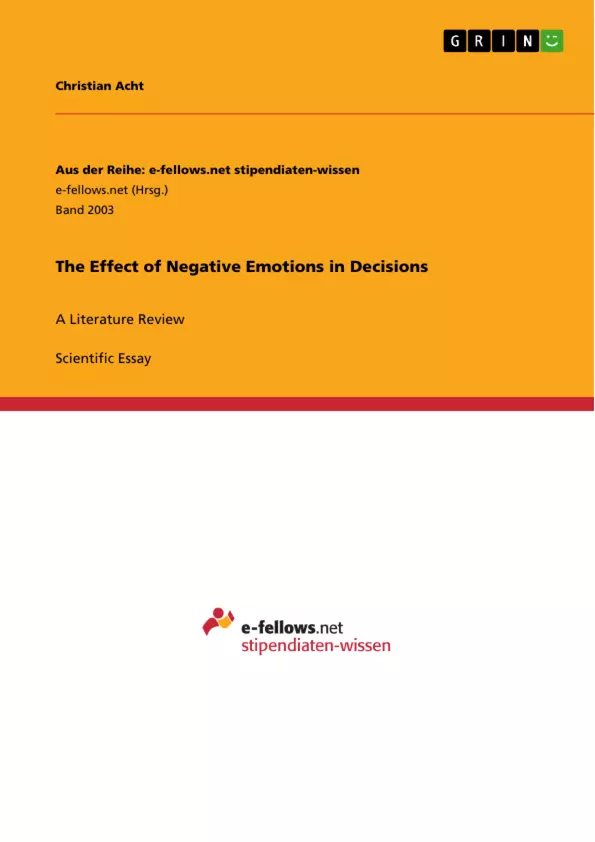Over the last four decades the topic of emotions and decision-making has gained relevance among psychologists. This paper presents a selective, qualitative review of the influence of the negative emotions fear, anger, sadness and disgust on the domains of judgement, choice and decision-making.
For this purpose it brings together traditional and contemporary theories from the field of emotion and decision-making and, building on this, reviews highly recognized and accepted research works that have concentrated on outcome effects. Negative emotions turned out to constitute major influence on judgement, choice and decision-making. The review of outcome effects has indicated that, in many cases, emotions of the same valence but with different appraisals can exert opposing effects on the decision outcome.
Inhaltsverzeichnis (Table of Contents)
- Introduction
- Conceptual Clarifications
- Valence
- Arousal
- Affect
- Emotion
- Mood
- Decisions
- Emotional Impact on Judgment, Choice and Decision-Making
- Types of Affective Influences
- Valence-based Approaches
- Affect-as-information Account
- Affect Infusion Theory
- From Valence-based Approaches to Emotion-specific Influences
- Appraisal-tendency Approach
- Synthesizing Traditional and Contemporary Scientific Models
- Emotion-Imbued Choice Model
- Choosing Emotions
- How might specific negative emotions influence judgment, choice and decision-making?
- Research Methodology
- The Effects of Fear
- The Effects of Anger
- The Effects of Sadness
- The Effects of Disgust
- Discussion of Effects
Zielsetzung und Themenschwerpunkte (Objectives and Key Themes)
This paper aims to provide a selective review of the effects of negative emotions on judgment, choice, and decision-making. It explores the most influential theories explaining the interplay of emotions and decision-making and examines the outcome effects of fear, anger, sadness, and disgust on these domains.
- Influence of negative emotions on decision-making
- Traditional and contemporary theories on emotion and decision-making
- Outcome effects of specific negative emotions (fear, anger, sadness, disgust)
- Impact of emotional valence on judgment, choice, and decision-making
- Appraisal-tendency approach in understanding emotional influence
Zusammenfassung der Kapitel (Chapter Summaries)
- Introduction: This chapter provides a background on the growing relevance of emotions in decision-making research, highlighting the gap in existing research and outlining the paper's objectives.
- Conceptual Clarifications: This chapter defines key terms used throughout the paper, including valence, arousal, affect, emotion, mood, and decisions.
- Emotional Impact on Judgment, Choice and Decision-Making: This chapter provides an overview of prominent theories on emotion and decision-making, including valence-based approaches, the affect-as-information account, the affect infusion theory, and the appraisal-tendency approach. It also discusses the Emotion-Imbued Choice Model and the concept of choosing emotions.
- How might specific negative emotions influence judgment, choice and decision-making?: This chapter outlines the research methodology employed to investigate the effects of fear, anger, sadness, and disgust. It then delves into the effects of each emotion on various decision-making domains.
Schlüsselwörter (Keywords)
This paper focuses on the interaction between emotion and decision-making, examining the influence of specific negative emotions (fear, anger, sadness, disgust) on judgment, choice, and decision-making processes. Key terms include emotion, decision-making, judgment, affect, cognition, choice, risk, valence, arousal, and appraisal-tendency.
Frequently Asked Questions
How do negative emotions affect decision-making?
Negative emotions like fear, anger, sadness, and disgust significantly influence judgment and choice, sometimes exerting opposing effects based on their specific appraisals.
What is the "Appraisal-tendency Approach"?
It is a framework used to understand how specific emotions, even with the same valence, can lead to different decision outcomes based on how an individual evaluates a situation.
Which specific emotions are analyzed in this paper?
The paper focuses on the qualitative review of four specific negative emotions: fear, anger, sadness, and disgust.
What is the difference between affect, emotion, and mood?
The paper provides conceptual clarifications for these terms, distinguishing them by factors like duration, intensity, and cause.
What is the "Affect Infusion Theory"?
It is a theoretical model discussed in the paper that explains how affective states can color and influence cognitive processes and decision-making.
- Quote paper
- Bachelor of Arts Christian Acht (Author), 2016, The Effect of Negative Emotions in Decisions, Munich, GRIN Verlag, https://www.grin.com/document/336518



